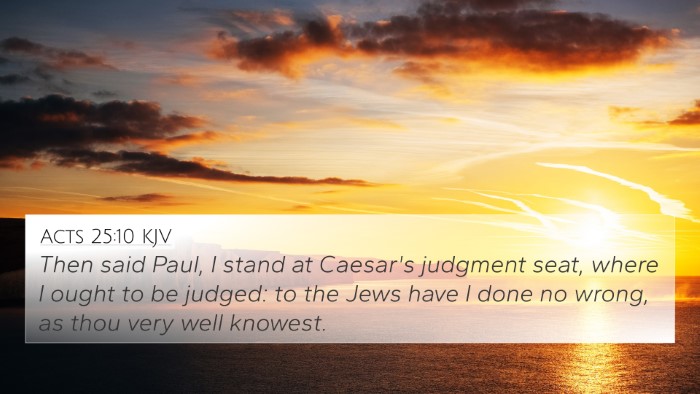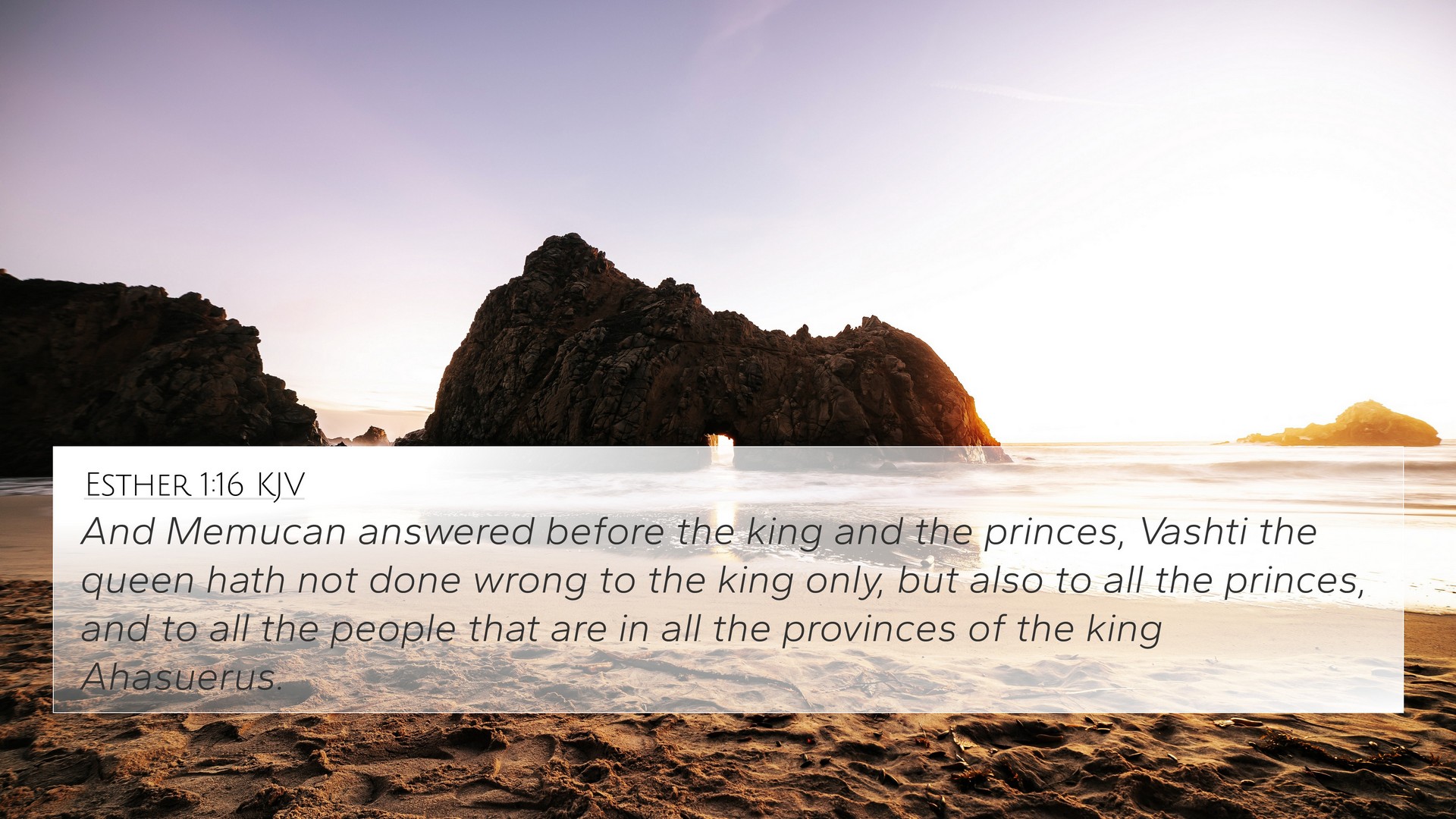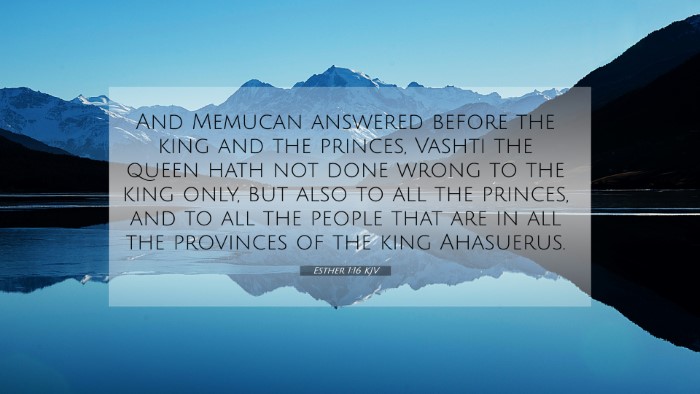Old Testament
Genesis Exodus Leviticus Numbers Deuteronomy Joshua Judges Ruth 1 Samuel 2 Samuel 1 Kings 2 Kings 1 Chronicles 2 Chronicles Ezra Nehemiah Esther Job Psalms Proverbs Ecclesiastes Song of Solomon Isaiah Jeremiah Lamentations Ezekiel Daniel Hosea Joel Amos Obadiah Jonah Micah Nahum Habakkuk Zephaniah Haggai Zechariah MalachiEsther 1:16 Similar Verses
Esther 1:16 Cross References
And Memucan answered before the king and the princes, Vashti the queen hath not done wrong to the king only, but also to all the princes, and to all the people that are in all the provinces of the king Ahasuerus.
Uncover the Rich Themes and Topics of This Bible Verse
Listed below are the Bible themes associated with Esther 1:16. We invite you to explore each theme to gain deeper insights into the Scriptures.
Esther 1:16 Cross Reference Verses
This section features a detailed cross-reference designed to enrich your understanding of the Scriptures. Below, you will find carefully selected verses that echo the themes and teachings related to Esther 1:16 KJV. Click on any image to explore detailed analyses of related Bible verses and uncover deeper theological insights.

Acts 25:10 (KJV) »
Then said Paul, I stand at Caesar's judgment seat, where I ought to be judged: to the Jews have I done no wrong, as thou very well knowest.

Acts 18:14 (KJV) »
And when Paul was now about to open his mouth, Gallio said unto the Jews, If it were a matter of wrong or wicked lewdness, O ye Jews, reason would that I should bear with you:

1 Corinthians 6:7 (KJV) »
Now therefore there is utterly a fault among you, because ye go to law one with another. Why do ye not rather take wrong? why do ye not rather suffer yourselves to be defrauded?
Esther 1:16 Verse Analysis and Similar Verses
Understanding Esther 1:16
Contextual Overview: Esther 1:16 occurs during a significant moment in the Persian court, reflecting themes of authority, respect, and the dynamics of power in relationships. This verse sets the stage for further developments in the narrative, particularly regarding Queen Vashti's defiance of King Xerxes.
Verse Text: "And Memucan answered and said before the king and the princes, Vashti the queen hath not done wrong to the king only, but to all the princes, and to all the people that are in all the provinces of the king Xerxes." - Esther 1:16
Verse Meaning and Commentary Insights
Memucan's Response:
This verse features Memucan, one of the king’s advisors, who makes a significant declaration. His remarks highlight that Vashti’s actions extend beyond personal offense to the king, implying a broader societal and political impact. This reflects the values of authority and obedience central to the Persian culture of the time.
Respect and Power Dynamics:
According to Matthew Henry, Memucan’s assertion illustrates the critical view of authority in the ancient world, emphasizing that the actions of a queen could undermine the king's authority and create unrest among the nobility, thus threatening the stability of the kingdom.
Collective Consequences:
Albert Barnes emphasizes that Memucan’s words serve to unify the council's perspective, determining that Vashti’s refusal to appear before the king would not only disgrace her but could also set a dangerous precedent for women throughout the kingdom. Hence, authority is a theme not just in relation to Esther and Xerxes, but encompassing societal norms and gender roles.
The Plea to the King:
Drawing on Adam Clarke's commentary, it is noted that Memucan was particularly keen on protecting the king's image and authority. His appeal demonstrates how political advisors functioned not only as political figures but also as guardians of social order, advising against any potential challenges that could arise from civil disobedience.
Cross-References
- Proverbs 31:10-31: Highlights the virtues of a noble woman and contrasts the ideal with Vashti’s defiance.
- 1 Peter 3:1-6: Discusses the attitudes of wives towards their husbands, reinforcing concepts of respect and submission.
- Daniel 6:10: A parallel on standing firm in adherence to one's principles, with external implications.
- Esther 4:16: Esther’s courageous actions provide a contrasting example of how to approach authority.
- Titus 2:3-5: Encouragements for women to exhibit behavior in alignment with the biblical standards for godliness.
- Ephesians 5:22-33: The divine perspective on marriage, authority, and mutual respect, serving as a contextual counterpoint.
- Colossians 3:18: Advises wives to submit to their husbands, aligning with the themes of authority presented in Esther.
Thematic Connections
The themes presented in Esther 1:16 resonate throughout the Bible with regards to authority, respect, and societal norms. The connection between Esther's actions and those themes can be further explored through:
- Authority and Obedience: These themes appear in multiple scriptures, depicting the expectations placed on individuals in positions of authority.
- Societal Impact of Personal Choices: Personal actions can lead to broader repercussions, as illustrated in various narratives across both Old and New Testaments.
- Gender Roles in Scriptural Context: The study of how women's actions and decisions are portrayed in different biblical narratives, particularly in leadership or defiance.
Conclusion
The analysis of Esther 1:16 unveils the complex interplay between personal defiance and societal expectation. Memucan’s remarks reflect a critical understanding of authority and respect that transcends individual narrative, linking back to broader theological discussions regarding women in the Bible, obedience, and the consequences of one's actions within a community.


